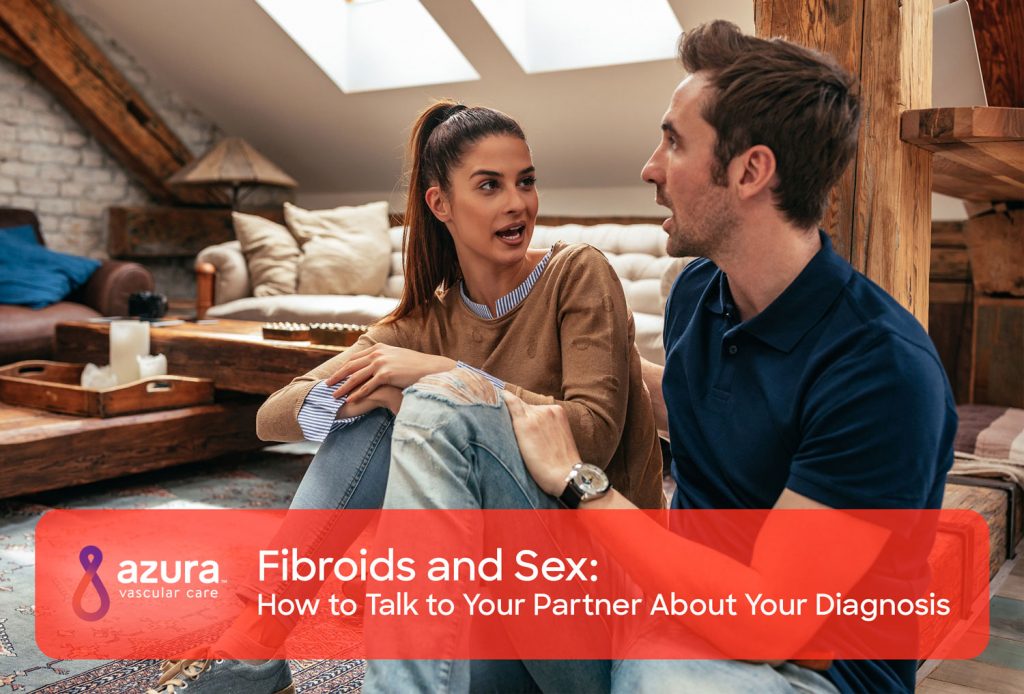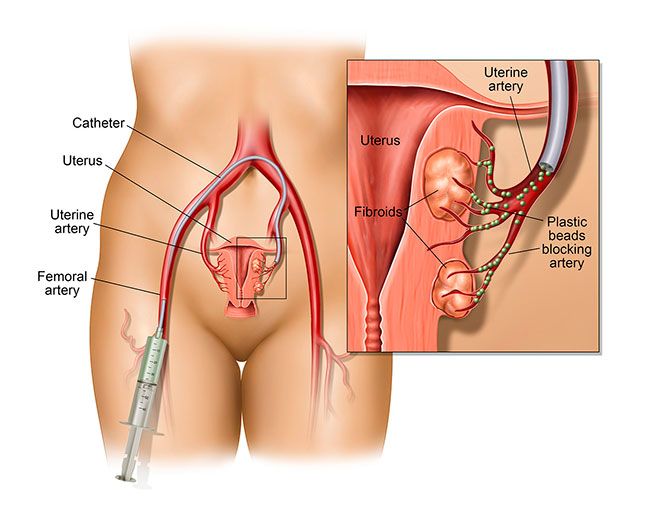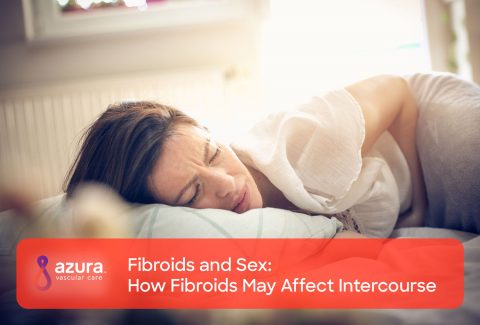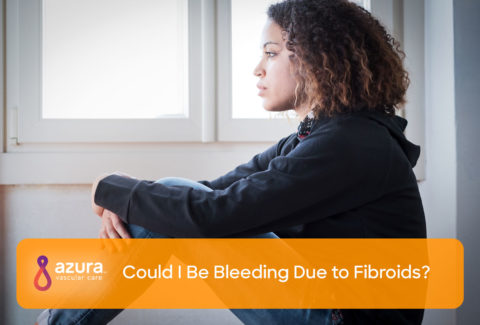
At times, fibroids can make having sex with your partner an uncomfortable experience. Women with large or multiple fibroids might feel pain during sex, causing them to not want to have sex as often or avoid it completely. They may also feel self-conscious about their bodies or less attractive, especially if they’ve put on weight or look pregnant due to the size and location of the fibroid.
If your partner feels rejected or doesn’t understand your condition, it can easily cause conflict. But, by having an open, honest conversation about uterine fibroids and painful intercourse, you’ll deepen your partner’s understanding of your condition—and hopefully your relationship.
Uterine Fibroids and Painful Intercourse
Every woman with fibroids experiences symptoms differently, but for some, sex is extremely painful. That pain may be due to pressure from the fibroids, vaginal dryness, or hormonal changes. Further complicating things, fibroid pain isn’t consistent. It can become more intense at certain times of the month or in some positions. Whatever the cause of painful intercourse, it can disrupt your sex life and cause a major strain on your relationship.
Severe menstrual pain and other fibroid symptoms, like urinary incontinence and exhaustion, may also affect your sex life. The heavy bleeding associated with uterine fibroids can make you feel tired and affect your concentration. You may feel embarrassed or scared of leaking through your clothing, not to mention that you may feel depressed, irritable or anxious. All of these side effects of fibroids can have an impact on your relationship, making sex with your partner stressful.
4 Tips for Talking to Your Partner About Fibroids and Sex
Your partner might not have any idea what you’re going through or why you are avoiding intimacy. Taking the time to have a transparent conversation is essential for both partners. Talk to your partner about how your fibroids are causing you pain during sex, or anxiety about having sex. Open communication is especially important when discussing uterine fibroids and painful intercourse. Let your partner know how you feel and respond by acknowledging their feelings as well.
Starting a conversation about fibroids and sex can be difficult. Here are some tips to open the lines of communication:
- Learn more about your condition: Your partner will probably have questions about how fibroids develop and how they affect your body. To answer them accurately, you’ll want to educate yourself on the condition.
- Choose the right time to talk: Don’t spring the conversation on your partner when you’re upset or don’t have enough time to fully discuss the issue. Let them know you want to talk about your health and choose a time and place that works for both of you. Make sure that you’re in a private environment that’s free from distractions.
- Be honest: Talk as openly as you can about your symptoms and how they specifically affect you and your sex life. Let your partner know that pain, fatigue, and heavy bleeding could interrupt your plans from time to time and that sex may be painful. Discuss ways to cope with your symptoms together.
- Be supportive: When you are the one experiencing pain and other symptoms, it’s easy to forget that your partner is affected by them too. They may be experiencing many of the same emotions that you are, including anger, frustration, helplessness, and even despair. Truly listen when your partner expresses their feelings and be supportive.
Treating Uterine Fibroids
There are many different approaches to managing and treating uterine fibroids, including watchful waiting, exercise, drug therapy, surgery and minimally invasive treatments. Hysterectomy—surgical removal of the uterus—is the only uterine fibroid treatment option that can guarantee your fibroids won’t return, but it comes with all the risks of major surgery, including bleeding, blood clots and infection. Also, after a hysterectomy, you are unable to become pregnant. If you wish to eventually become pregnant, you may want to consider a nonsurgical treatment option that will leave your uterus intact, provide symptomatic relief with less risk and a shorter recovery period. Speak to your vascular specialist to determine the best treatment for your uterine fibroid condition, including nonsurgical treatments.
Uterine fibroid embolization (UFE) is one alternative to surgery.
During UFE, a thin catheter is threaded into the blood vessels that supply blood to the fibroid. Then, tiny medical-grade plastic particles are injected into the blood vessels. This blocks the blood supply to the fibroid, causing it to shrink and die.
The best candidates for UFE are women who:[i]
- Have fibroids that are causing heavy bleeding
- Have fibroids that are causing pain or pressing on the bladder or rectum
- Don’t want to have a hysterectomy
- Don’t want to have children in the future
A recent study found that women with painful uterine fibroids saw an improvement in their sex lives and significant symptom relief a year after undergoing UFE. In fact, nearly eight in 10 women who completed surveys a year after treatment reported improved sexual function, defined as decreased pain and increased desire, arousal, and satisfaction.[ii] Further, about nine in 10 reported a better overall quality of life.[ii]
To learn if you’re a candidate for UFE, download our free information sheet, Understanding Uterine Fibroid Embolization, or call 844-UFE-CARE (833-2273) to schedule an appointment with a vascular specialist today.
Sources:
[i] Office on Women’s Health. (2018, March 16). Uterine fibroids. Retrieved from https://www.womenshealth.gov/a-z-topics/uterine-fibroids
[ii] Pallarito, K. (2016, April 04). Women’s Sex Lives Get a Boost After Non-Surgical Fibroid Treatment. Retrieved June 15, 2018, from https://consumer.healthday.com/women-s-health-information-34/fibroids-news-309/women-s-sex-lives-get-a-boost-after-non-surgical-fibroid-treatment-709548.html
![She Said “NO” to a Hysterectomy [Patient Story]](https://www.azuravascularcare.com/assets/She-Said-no-to-a-Hysterectomy-480x325.jpg)

